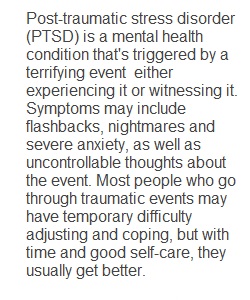


Q Discussion: Trauma and Stressor-Related Disorders - Discussion Group 1 From PSYC-01A-52041 1212 unread replies.3333 replies. In trauma and stressor-related disorders, the individual shows yet greater difficulty coming to terms with traumatic events. Posttraumatic Stress Disorder (PTSD) Acute Stress Disorder If you haven't already, view the short film Posttraumatic stress disorder (PTSD) is characterized by a rapid heart rate and feelings of anxiety and helplessness that are caused by a traumatic experience. Such experiences may include a natural or human-made disaster, a threat or assault, or witnessing a death. It frequently occurs among firefighters, combat veterans, and people whose homes and communities have been swept away by natural disasters or who have been victims of accidents or interpersonal violence (Brenner, J. D., 2016). The traumatic event is revisited in the form of intrusive memories, recurrent dreams, and flashbacks—the feeling that the event is recurring (McDevitt-Murphy et al., 2010). People with PTSD typically try to avoid thoughts and activities connected to the traumatic event. They may also find it more difficult to enjoy life, and they often have sleep problems, irritable outbursts, difficulty concentrating, extreme vigilance and an intensified “startle” response. Read the article UCLA study identifies genes linked to post-traumatic stress disorder Download UCLA study identifies genes linked to post-traumatic stress disorder, by Elaine Schmidt. This study suggests that genes involved in serotonin production may make some people more vulnerable to PTSD than others. Does this sound like a good line of research, or is PTSD too complicated to focus on just one area? Give your thought on this in a 250-300 word reply. Respond to at least two other students in 75-100 words. Note: Click the options button in the upper right corner to see the rubric for this exercise.
View Related Questions